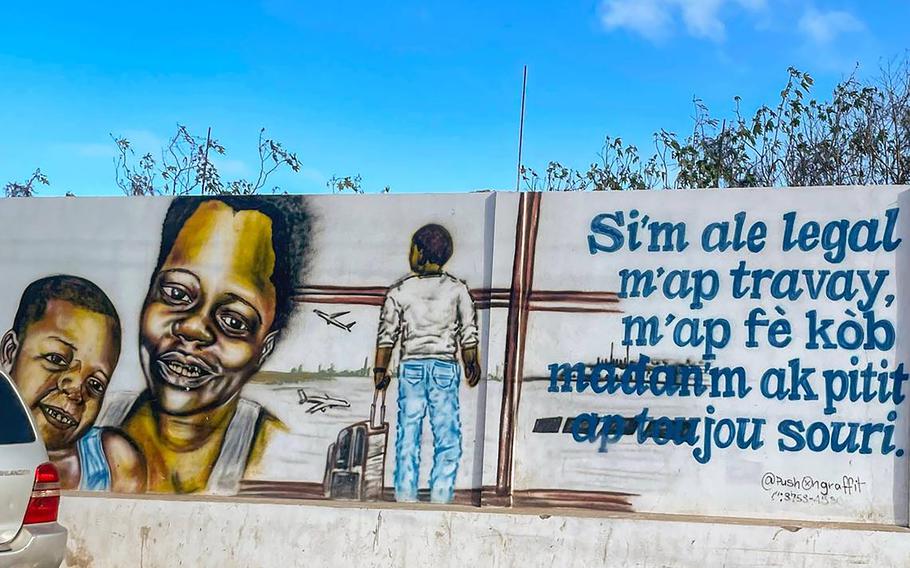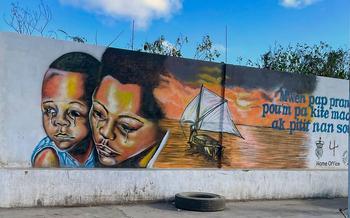
A mural in the northern port city of Cap-Haïtien warns Haitians about the perils of illegal migration. (Jacqueline Charles/Miami Herald/TNS)
(Tribune News Service) — A Vodou ceremony aboard a boat filled with desperate Haitian migrants seeking a safe landing ended in tragedy after candles and matches used in the ritual set gasoline-filled drums on fire, setting off an explosion that killed at least 40 people.
The tragedy unfolded around 3 a.m. Wednesday off the coast of Labadie in northern Haiti. The boat had initially departed from Fort Saint Michel, a seaside community in the city of Cap-Haïtien, near the international airport.
After leaving Cap-Haïtien the boat made a stop at Picolet, off Labadie, several Haitians told the Miami Herald. The area is considered sacred and before the risky migrant journey, boat captains from Cap-Haïtien routinely stop there to seek help from Vodou spirits for a safe and undetected journey. The secret ritual usually involves rum.
“When they arrived they started pouring rum and wine into the ocean and they lit candles. There were two drums filled with gasoline and they exploded,” said Jean-Henry Petit, who is responsible for the Office of Civil Protection for northern Haiti.
Petit said some of the survivors blamed the tragedy on the use of wine in the ceremony, which is considered a bad omen because it symbolizes blood . He said there were as many as 80 Haitians onboard, according to survivors.
The use of Vodou in clandestine boat voyages is common and often credited for Haitians’ safe and undetected arrival at their destination. The details of the intricate rituals are a closely held secret. But generally, Vodou faithfuls say the ceremonies can include drumming , chanting and paying homage to the Vodou spirit Agwé, who they believe rules the sea. Sometimes Haitian rum is poured, a citrus-scented cologne named Florida Water is sprayed, and a chicken is sacrificed.
The International Organization for Migration, a United Nations agency, said 40 Haitians are presumed to have died at sea and 41 others were rescued. The boat was headed to the Turks and Caicos Islands, a British Overseas Territory about 155 miles from Haiti. A popular tourist destination, the island-chain is also popular among Haitians seeking to escape their country’s deadly gang violence and opting not to risk the longer, riskier voyage to the Florida coast.
“Haiti’s socioeconomic situation is in agony. The extreme violence over the past months has only brought Haitians to resort to desperate measures even more,” Grégoire Goodstein, Haiti chief of mission for the agency.
Goodstein said the tragedy “highlights the risks faced by children, women and men migrating through irregular routes” and underscores the crucial need for safe and legal pathways for migration.
Survivors said that while there were originally 60 people aboard the boat, it took on additional individuals as it was being loaded. The passengers were initially rescued by another boat that had departed from Port-de-Paix in the northwest before Haitian Coast Guard was notified and completed the rescue, Haitian authorities said. At least 11 people were initially hospitalized, but as of Friday, only one person had not yet been discharged.

A mural in the northern port city of Cap-Haïtien warns Haitians about the perils of illegal migration. (Jacqueline Charles/Miami Herald/TNS)
Haitians face a lack of economic opportunities, a collapsing health system and school closures. The lack of prospects, along with the ongoing gang violence and kidnappings that are spreading beyond Port-au-Prince are pushing many to consider fleeing the country. A 2023 research by the organization for migration found that 84% of migrants who had been returned to Haiti had left to seek job opportunities abroad.
With visa services suspended by the U.S. embassy, legal migration has become “an extremely challenging journey to consider, let alone pursue,” the United Nations agency noted, leaving many Haitians to view risky, irregular migration as their only option.
After several powerful armed gangs in Port-au-Prince united and began launching coordinated attacks in late February, the Haitian Coast Guard in the north has noted an increase in the number of boat departures. Coast guards from countries in the region, including the United States, The Bahamas, the Turks and Caicos Islands, and Jamaica, have also reported a growing number of boats intercepted at sea carrying Haitians.
Late Thursday, the United State Coast Guard and Royal Bahamas Defense Force announced the suspension of a search for 60 Haitian migrants who presumably left The Bahamas bound for Florida.
Last year, the Turks and Caicos reported interdicting 4,016 migrants at sea. So far this year 865 undocumented migrants have been interdicted at as of June 25, said Denyse Renne, a spokeswoman with the Royal Turks and Caicos police. Though the island-chain is seeing an overall reduction in undocumented migrants interdicted at sea, U.N data shows that the number of Haitians being returned from the British territory is on the rise.
According to the U.N. migration agency, more than 86,000 people have been forcibly returned to Haiti by neighboring countries this year, 13,000 just in March alone. The majority of the returns are from the Dominican Republic, which shares the island of Hispaniola with Haiti.
The U.N. migration group “is concerned about the high number of forced returns of Haitians during this current period of civil unrest and uncertainty,” the agency said. “Forced returns must occur in a dignified manner. Many migrants forcibly returned, including unaccompanied and separated children as well as pregnant and nursing women, arrive in Haiti in highly vulnerable conditions, often with few resources. They urgently need humanitarian assistance after facing numerous health and protection concerns during their journeys.”
©2024 Miami Herald.
Visit at miamiherald.com.
Distributed by Tribune Content Agency, LLC.